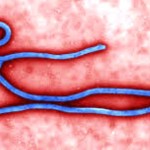 We are fortunate to live in a world where many ills and diseases from the past no longer pose a threat to the health of society throughout the world. Unfortunately, the Ebola virus still haunts parts of the globe, namely in Guinea and Liberia, where nearly 200 people have been infected or killed by this disease within the past two months. West Africa is facing an onslaught of this contagion, where the Ebola virus is spreading rapidly.
We are fortunate to live in a world where many ills and diseases from the past no longer pose a threat to the health of society throughout the world. Unfortunately, the Ebola virus still haunts parts of the globe, namely in Guinea and Liberia, where nearly 200 people have been infected or killed by this disease within the past two months. West Africa is facing an onslaught of this contagion, where the Ebola virus is spreading rapidly.
Ebola is a type of hemorrhagic fever, distinctive by the fact that it is a group of viruses that affect numerous organs and systems within the body. This disease is usually accompanied by internal and even external bleeding, and currently there is no vaccination for it.
The World Health Organization (WHO) has reported that there are five different strains of the virus, respective to the regions that they originated in. Currently, only three of the five strains have been identified as pervasive within the West Africa outbreak. While there is no cure at present for Ebola, Doctors Without Borders (DWB) has been administering medication to victims and keeping those affected in quarantines in an effort to further limit the virus’ rapid spread from west Africa.
DWB is a non-profit that delivers emergency medical assistance to communities around the globe, and has been working briskly to keep pace with the unexpected outbreak. Thankfully, Ebola is not an airborne disease, so only those who have been in direct contact with the infected run the risk of catching it.
The reason for such heightened apprehension regarding the virus is that it ends up killing about 90 percent of those it infects. Ebola’s early stage symptoms can include headaches, muscle pain, sore throat, a rapid onset of fever, rashes, chest pains, and difficulty breathing. These symptoms frequently give way to vomiting and diarrhea.
Humans contract the virus through contact with animals that carry the disease. This then spreads to other humans via the transmission of bodily fluids. In most cases, individuals were looking after a family member who was sick, and end up catching Ebola themselves.
While the virus is deadly once contracted, DWB has mentioned that Ebola can actually be destroyed by natural forces or with household items. Sunlight, exposure to heat, common soaps and detergents are all capable of eliminating Ebola. Kamiliny Kalahne of DWB says that most outbreaks take place in areas that do not have access to resources such as running water, or equipment that can facilitate properly sterile interaction with patients.
The death of hundreds is no happy matter, but thankfully the outbreak has been contained within Guinea and Liberia, in spite of purported cases throughout other areas of Africa. The most recently recorded viral spread was in the Democratic Republic of Congo, and Uganda. This means that since Guinea and Liberia are new to the disease, many of the doctors and medical staff in the area are still struggling to handle the situation. Fortunately, there are more staff being issued to the area promptly.
Experts consider that the current outbreak of Ebola was due to animals that carried the virus from central Africa through forest regions to its current grounds in western Africa. Teams of researchers and professionals are gearing up to make a more concerted approach towards eliminating, or at least further concentrating, the virus such that there is a lesser fear of future outbreaks. Until then, West Africa is making a valiant effort to halt the rapid spread of the Ebola virus.
Source: Liberty Voice

















